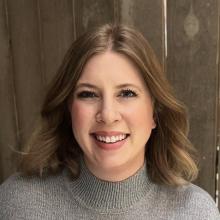June 2022 Spotlight on SRCD U.S. Federal Policy Fellow: Kelsey McKee, Ph.D.
Kelsey McKee is a SRCD Federal Executive Branch Policy Fellow who is placed in the Office of Head Start (OHS), Administration for Children and Families (ACF), U.S. Department of Health and Human Services (HHS).
In retrospect, Project Head Start, as it was originally named, was a radical experiment in the application of the burgeoning field of developmental science. The leading academic minds empowered communities to combat poverty by supporting young children and their families. This innovative approach established a legacy of leadership that continues almost 60 years later. Head Start is a leader in the field of early care and education (ECE) and an exemplar of the two-generation intervention approach. It is also a rare case of a direct federal-to-local model where a federal program is administered directly within local communities rather than passing through state systems. As an SRCD Federal Executive Branch Policy Fellow placed in the Office of Head Start (OHS) in the Administration for Children and Families (ACF), I am afforded a unique perspective of a program operating at the intersection of research, policy, and practice.
My first fellowship year at OHS has given me a great opportunity to apply my training in developmental science to real world problems and expand my skills within the policy sphere. Several aspects of my portfolio at OHS are closely aligned with my research background. For example, I work with colleagues across OHS to consider how to best assess classroom quality in diverse settings and in the delicate context of the COVID-19 pandemic. I also work with colleagues in both OHS and the Office of Planning, Research, and Evaluation (OPRE) to facilitate the translation of research to practice and policy. In both efforts, we think critically about what empirical questions are salient to current policy challenges and how research can inform best practices.
While my academic and professional experience has centered on supporting parents of young children, my fellowship has also given me the opportunity to expand that focus to other critical caregivers - the Head Start workforce. Currently, many are grappling with pandemic and workforce-related challenges, particularly those in the ECE field. Thus, a large part of my portfolio is focused on how OHS and ACF can support those educating and caring for the most vulnerable children and families. To this end, I have drafted policy guidance and clarifications to help programs better support their staff and collaborated with training and technical assistance providers to ensure programs have access to the most effective workforce support strategies. I’ve also partnered with colleagues across ACF to facilitate webinars, alongside the Department of Education and the Department of Labor, to increase uptake of federal programs such as Registered Apprenticeships and Public Service Loan Forgiveness in the ECE field.
Even though I am not conducting research at OHS, I am using the underlying skills gained during my methodological training and learning to apply them in new ways. Along with my colleagues, I have to examine hidden assumptions, ask how we are conceptualizing and measuring concepts, identify mechanisms of influence, and explore what contextual factors might act as moderators. However, now there is a new wrinkle that was much less palpable in academic settings: consequence. Working in the policy space means making difficult decisions about limited resources in a timely manner with available evidence. The risks are no longer contained to a limitations section - we must consider what will happen to real children, families, and caregivers as a direct result of a policy decision. We have to ask ourselves - how sure are we about the accuracy of this data, this assumption, this conclusion? If we are wrong, a child, parent, or teacher will feel the consequences. On the other hand, we may miss an opportunity to help a child that we could have reached had we made a different decision.
At the same time, I am heartened by the tangible benefits of the translation of science to policy. Stories from children, families, staff, and Head Start alumni speak to the value and importance of this work. The risk is real, but so is the impact. The radical experiment in applying developmental science is working.
